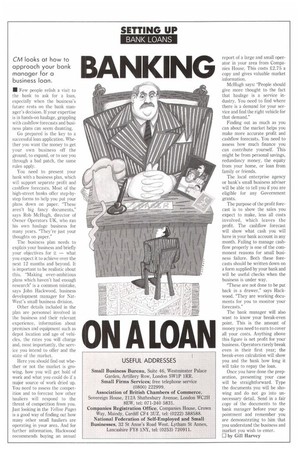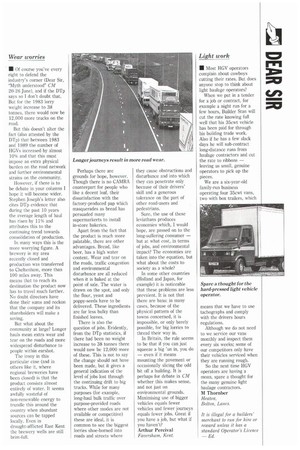BANKING
Page 38

Page 39

If you've noticed an error in this article please click here to report it so we can fix it.
CM looks at how to approach your bank manager for a business loan.
• Few people relish a visit to the bank to ask for a loan, especially when the business's future rests on the bank manager's decision. If your expertise is in hands-on haulage, grappling with cashflow forecasts and business plans can seem daunting.
Go prepared is the key to a successful loan application. Whether you want the money to get your own business off the ground, to expand, or to see you through a bad patch, the same rules apply.
You need to present your bank with a business plan, which will support separate profit and cashflow forecasts. Most of the high-street banks offer step-bystep forms to help you put your plans down on paper. "These aren't big fancy documents," says Rob McHugh, director of Owner Operators UK, who ran his own haulage business for many years. "They're just your thoughts on paper."
The business plan needs to explain your business and briefly your objectives for it — what you expect it to achieve over the next 12 months and beyond. It is important to be realistic about this. "Making over-ambitious plans which haven't had enough research" is a common mistake, says John Hackwood, business development manager for NatWest's small business division.
Other details included in the plan are personnel involved in the business and their relevant experience, information about premises and equipment such as depot location and age of vehicles, the rates you will charge and, most importantly, the service you intend to offer and the state of the market.
Here you should find out whether or not the market is growing, how you will get hold of work and what you could do if a major source of work dried up. You need to assess the competition and to forecast how other hauliers will respond to the threat of competition from you. Just looking in the Yellow Pages is a good way of finding out how many other small hauliers are operating in your area. And for further information, Hackwood recommends buying an annual report of a large and small operator in your area from Companies House. This costs 2,2.75 a copy and gives valuable market information.
McHugh says: "People should give more thought to the fact that haulage is a service industry. You need to find where there is a demand for your service and find the right vehicle for that demand."
Finding out as much as you can about the market helps you make more accurate profit and cashflow forecasts. You need to assess how much finance you can contribute yourself. This might be from personal savings, redundancy money, the equity from your home, or loan from family or friends.
The local enterprise agency or bank's small business adviser will be able to tell you if you are eligible for any Government grants.
The purpose of the profit forecast is to show the sales you expect to make, less all costs involved, which leaves the profit. The cashflow forecast will show what cash you will have in your bank account in any month. Failing to manage cashflow properly is one of the commonest reasons for small business failure. Both these forecasts should be written down on a form supplied by your bank and will be useful checks when the business is under way.
"These are not done to be put back in a drawer," says Hackwood. "They are working documents for you to monitor your forecasts."
The bank manager will also want to know your break-even point. This is the amount of money you need to earn to cover all your costs. Anything above this figure is net profit for your business. Operators rarely break even in their first year; the break-even calculation will show you and the bank how long it will take to repay the loan.
Once you have done the preparation, presenting your case will be straightforward. Type the documents you will be showing and do not go into unnecessary detail. Send in a fair copy of the documents to the bank manager before your appointment and remember you are demonstrating to him that you understand the business and market you wish to enter.
El by Gill Harvey • Of course you've every right to defend the industry's corner (Dear Sir, "Myth understood" CM 20-26 June), and if the DTp says so I don't doubt that. But for the 1983 lorry weight increase to 38 tonnes, there would now be 12,000 more trucks on the road.
But this doesn't alter the fact (also attested by the DTp) that between 1983 and 1989 the number of HGVs increased by almost 10% and that this must impose an extra physical burden on the road network and further environmental strains on the community.
However, if there is to be debate in your columns I hope it will become wider. Stephen Joseph's letter also cites DTp evidence that during the past 10 years the average length of haul has risen by 11% and attributes this to the continuing trend towards consolidation of production.
In many ways this is the more worrying figure. A brewery in my area recently closed and production was transferred to Cheltenham, more than 100 miles away. This means that to reach its destination the product now has to travel much further. No doubt directors have done their sums and reckon that the company and its shareholders will make a saving.
But what about the community at large? Longer hauls mean extra wear and tear on the roads and more widespread disturbance to people within earshot.
The irony in this particular case (and in others like it, where regional breweries have been closed) is that the product consists almost entirely of water. It seems awfully wasteful of non-renewable energy to trundle this around the country when abundant sources can be tapped locally. Even in drought-afflicted East Kent the brewery wells are still brim-full.
Perhaps there are grounds for hope, however. Though there is no CAMRA counterpart for people who like a decent loaf, their dissatisfaction with the factory-produced pap which masquerades as bread has persuaded many supermarkerts to install in-store bakeries.
Apart from the fact that the product is much more palatable, there are other advantages. Bread, like beer, has a high water content. Wear and tear on the roads, traffic congestion and environmental disturbance are all reduced when it is baked at the point of sale. The water is drawn on the spot, and only the flour, yeast and poppy-seeds have to be delivered. These ingredients are far less bulky than finished loaves.
There is also the question of jobs. Evidently, from the DTp statistics, if there had been no weight increase to 38 tonnes there would now be 12,000 more of these. This is not to say the change should not have been made, but it gives a general indication of the level of jobs lost through the continuing drift to big trucks. While for many purposes (for example, long-haul bulk traffic over purpose-provided roads where other modes are not available or competitive) these are ideal, it is common to see the biggest lorries shoe-horned into roads and streets where they cause obstructions and disturbance and into which they can penetrate only because of their drivers' skill and a generous tolerance on the part of other road-users and pedestrians.
Sure, the use of these leviathans produces economies which, I would hope, are passed on to the long-suffering consumer — but at what cost, in terms of jobs, and environmental impact? The economies are taken into the equation, but what about the costs to society as a whole?
In some other countries (Holland and Japan, for example) it is noticeable that these problems are less prevalent. It is not that there are bans: in many cases, because of the physical pattern of the towns concerned, it is impossible, or only barely possible, for big lorries to thread their way in.
In Britain, the rule seems to be that if you can just squeeze a big 'un in, you do — even if it means mounting the pavement or occasionally slicing the odd bit off a building. It is perhaps for debate in CM whether this makes sense, and not just on environmental grounds. Maximising use of bigger vehicles equals fewer vehicles and fewer journeys equals fewer jobs. Great if you have a job, but what if you haven't?
Arthur Percival Faversham, Kent.












































































